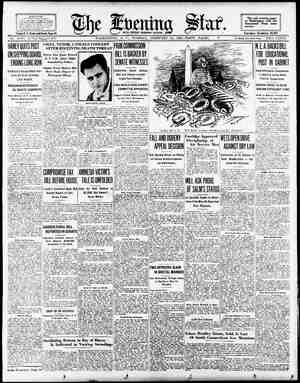Evening Star Newspaper, February 23, 1926, Page 33
You have reached the hourly page view limit. Unlock higher limit to our entire archive!
Subscribers enjoy higher page view limit, downloads, and exclusive features.
THE EVENING BT THIS 75 the advertisement which won the One Thousand Dollar Harvard Award, founded by Edward W. Bok, for the most distinguished single ddvertisemcit appearing in 1925, “most effective in the use of text.” The text is as true today as when it appeared last October in this newspaper — with this corvection: The circulation of NATION'S BUSINESS #s not 200,947; today it #s 218,844, WASHINGTON, D. C, TUESDAY, FEBRUARY 23, 1926. LET WASHINGTON DO IT” N IOWA shoe dealer writes—«There ought to be a law to limit the styles of shoes.” As a people, we have come to expect the Federal Govern- ment to perform economic miracles. “Pass a law” has become the national panacea. If we think the price of wheat is too low,we say to Washington—"Please raise the price of wheat.” If we think the price of sugaris too high, wesay to Washington — “Please lower the price of sugar.” We ask Washington to lower the freight rates and in the same breath re- quest higher wages for railroad labor. We haven’t yet thought of a glorious third law compelling the railroads at the same time to pay higher dividends —and to pay them oftener. Aren’t we asking too much of our legislators? They are not supermen. The cynic says that the trouble with representative government is that it truly represents. It does truly represent—and therein lies its great strength. But it can no more repeal economic law than it can repeal the laws of nature. WASHINGTON is just a great cross-section of American citizénry —hard-working, honest, doing its best under 2 deluge of instruction from all of us, the burden of which is—*There ought to be a law . . .” . Last year 100,000 new laws -were proposed in this land of the free, where already there are 1,900,000 on the statute books. We have come to ask Congress to do everything from enacting a maternity bill to running a three-billion-dollar merchant marine. “We forget that our forefathers who created the greatest form of Government of all time did not design that political mechanism to operate businessenterprises. The checks and balances, designed to protect political liberty, by their very nature prevent efficient operation of business projects. As Herbert Hoover puts it, “The Government lacks rapidity ofdecision.” Which is proper. Itcan’tcut corners. There must be debate. Even red tape. Business must make quick decisions. Yet we go blithely ahead, asking Washington to enter new fields of busi- ness activity. We forget that every entry requires more laws, more office- holders, more expense, more taxes. ORE important,every law which puts Government into business strikes at that which has made this Nation great— individual reward for individual effort. Our national legislative mill will soon start grinding again. A large part of its - grist, by far, will deal with business ques- tions; your business and your neighbor’s. For this is an economic age—anagein which industry has become so inter- related that a law directed at one activity extends out afid on, affecting a score of others in unlooked-for industries and localities. AN IMPERATIVE nced today is a better understanding of the growing relations between Government and busi- ness, and also a better appreciation of the dependence of every industry upon every other. NATION'S BUSINESS is 2 magazine devoted to this end. It is published in ‘Washington by the largest business organ- ization in the country, and is fouaded on the belief that anything which is not for the public good is not for the good of business. That the value of NATION'S BUSINESS is recognized by American business men is attested by this publication’s growth. Thecirculation of NATION'S BUSINESS one year ago was160,890. Today itis 200,947. -_om VIIII}X\\\\\ 2\ o m ) “\) = MERLE THORPE, Editor PUBLISHED MONTHLY AT WASHINGTON BY THE Q-I'AMDBR OF COMMERCE OF THE UNITED STATES




